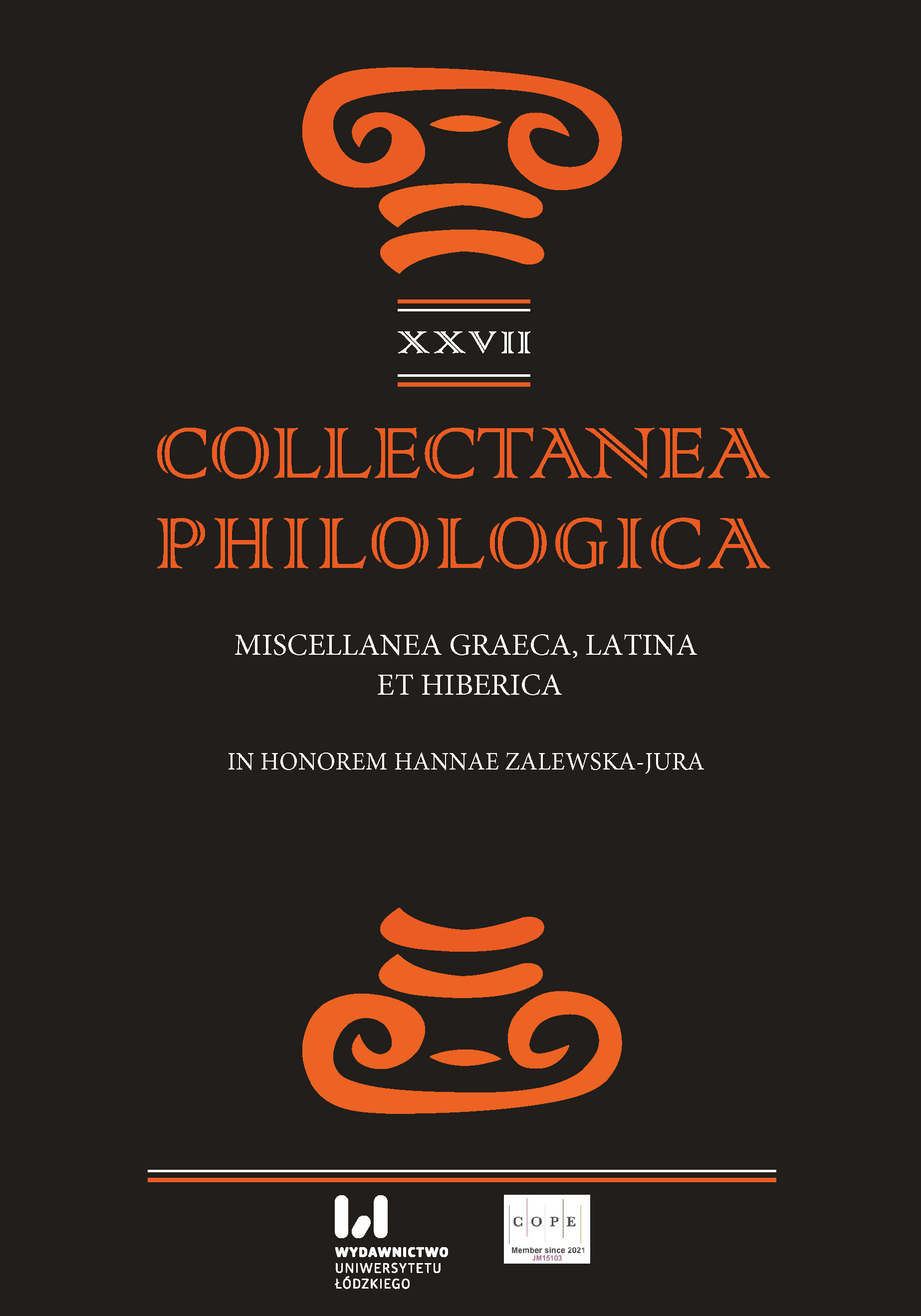“You Started the Dispute” – an Essential Argument in Controversies Typical of Oral Cultures and the Discoursive Blueprint of the "Iliad"
DOI:
https://doi.org/10.18778/1733-0319.27.02Słowa kluczowe:
Iliada, Homer, dyskurs oralny, kultura egalitarna, Parys/AleksanderAbstrakt
The paper argues that in the imagery found in the narrative context of the Iliad, the image of public debates is involved. Especially the argument “you started the dispute” is emphasized because it is connected with the concept of blame attributed to Paris and all the Trojans. Under the influence of such works like Graeber and Wengrow (2021), that shed a new light on the prehistory of mankind, I postulate a change in the paradigm of the interpretation of the Homeric world. I believe it would be much more comprehensible if interpreted as expressing egalitarian relations. After all, social and political circumstances described in the Iliad correspond to the phase in which hierarchy is only an increasing tendency. Comparisons drawn from other egalitarian cultures indicate how significant it is who started the dispute and how this argument can be cancelled. In the blueprint of the Iliad, however, Paris’ blame defines the meaning of the Trojan story and, therefore, the indictment that it was Alexander who started the dispute plays a paramount role.
Bibliografia
Andersen, Ø. (1997). Diomedes, Aphrodite, and Dione: Background and Function of a Scene in Homer’s Iliad. Classica et Mediaevalia 48. 25–36.
Google Scholar
Beekes, R. (2010). Etymological Dictionary of Greek. Leiden–Boston: Brill.
Google Scholar
Boehm, Ch. (2001). Hierarchy in the Forest. The Evolution of Egalitarian Behavior. Cambridge (Mass.)–London (England): Harvard University Press. https://doi.org/10.2307/j.ctvjf9xr4
Google Scholar
DOI: https://doi.org/10.2307/j.ctvjf9xr4
Bonifazi, A. (2007). Memory and Visualization in Homeric Discourse Markers. In: E.A. Mackay (ed.). Orality and Literacy in Ancient Greece. Vol. 7, Orality, Literacy, Memory in the Ancient Greek and Roman World. Mnemosyne, Supplements 298. Leiden: Brill. 35–64. https://doi.org/10.1163/ej.9789004169913.i-284.15
Google Scholar
DOI: https://doi.org/10.1163/ej.9789004169913.i-284.15
Burkert, W. (1992). The Orientalizing Revolution. Trans. M.E. Pinder. Cambridge (Mass.): Harvard University Press.
Google Scholar
Collins, D. (2004). Master of the Game: Competition and Performance in Greek Poetry. Washington D.C.: Harvard University Press.
Google Scholar
Currie, B. (2016). Homer’s Allusive Art. Oxford: Oxford University Press.
Google Scholar
Davies, M. (2003). The Judgements of Paris and Solomon. Classical Quarterly 53. 32–43. https://doi.org/10.1093/cq/53.1.32
Google Scholar
DOI: https://doi.org/10.1093/cq/53.1.32
Durkheim, E. (1933). The Division of Labor in Society. New York: Free Press.
Google Scholar
Elmer, D. (2013). The Poetics of Consent: Collective Decision Making and the Iliad. Baltimore: John Hopkins University Press.
Google Scholar
Finkelberg, M. (2015). Meta-Cyclic Epic and Homeric poetry. In: M. Fantuzzi, Ch. Tsagalis (eds.). The Greek Epic Cycle and its Ancient Reception: A Companion. Cambridge: Cambridge University Press. 126–138. https://doi.org/10.1017/CBO9780511998409.008
Google Scholar
DOI: https://doi.org/10.1017/CBO9780511998409.008
Fries, C. (1903). Griechisch-orientalische Untersuchungen I. Homerische Beiträge A: Zur Geschichte des epischen Stils und einiger homerischer Motive. Klio 3. 372–396. https://doi.org/10.1524/klio.1903.3.3.372
Google Scholar
DOI: https://doi.org/10.1524/klio.1903.3.3.372
Graeber, D., Wengrow, D. (2023). Narodziny wszystkiego. Nowa historia ludzkości, przeł. R. Filipowski. Poznań: Wydawnictwo Zysk i S-ka.
Google Scholar
Gresseth, G.T. (1975). The Gilgamesh Epic and Homer. Classical Journal 70 (4). 1–18.
Google Scholar
Kirk, G.S. (1985). The Iliad. A Commentary. Vol. I. Books 1–4. Cambridge: Cambridge University Press. https://doi.org/10.1017/CBO9780511620263
Google Scholar
DOI: https://doi.org/10.1017/CBO9780511620263
Lee, R. (1984). The Dobe! Kung. Chicago: Holt, Rinehart, and Winston.
Google Scholar
Littleton, C.S. (1970). Some Possible Indo-European Themes in the Iliad. In: J. Puhvel (ed.) Myth and Law among the Indo-Europeans. Berkeley–Los Angeles. 229–246.
Google Scholar
Martin, R. (1989). The Language of Heroes. Speech and Performance in the Iliad. Ithaca: Cornell University Press.
Google Scholar
Muellner, L. (1990). The Simile of Cranes and Pygmies: A Study of Homeric Metaphor. Harvard Studies in Classical Philology 93. 59–101. https://doi.org/10.2307/311283
Google Scholar
DOI: https://doi.org/10.2307/311283
Nagy, G. (1999). The Best of the Achaeans: Concepts of the Hero in Archaic Greek Poetry. Baltimore: John Hopkins University Press.
Google Scholar
Nickel, R. (1997). Paris in the Epic Tradition: A Study in Homeric Techniques of Characterization. PhD diss., University of Toronto.
Google Scholar
Robinson, D. (1990). Homeric φίλος: Love of Life and Limbs, and Friendship with One’s θυμός. In: Owls to Athens: Essays on Classical Subjects Presented to Sir Kenneth Dover. Oxford: Clarendon Press. 97–108.
Google Scholar
DOI: https://doi.org/10.1093/oso/9780198144786.003.0011
Schein, S.L. (1984). The Mortal Hero: An Introduction to Homer’s Iliad. Berkeley: University of California Press. https://doi.org/10.1525/9780520341067
Google Scholar
DOI: https://doi.org/10.1525/9780520341067
Schein, S.L. (1997). The Iliad: Structure and Interpretation. In: I. Morris, B. Powell (eds.). A New Companion to Homer. Leiden: Brill. 345–359. https://doi.org/10.1163/9789004217607
Google Scholar
DOI: https://doi.org/10.1163/9789004217607_016
Seaford, R. (1994). Reciprocity and Ritual: Homer and Tragedy in the Developing City-State. Oxford: Clarendon Press. https://doi.org/10.1093/oso/9780198149491.001.0001
Google Scholar
DOI: https://doi.org/10.1093/oso/9780198149491.001.0001
Suter, A. (1993.) Paris and Dionysos: Iambos in the Iliad. Arethusa 26. 1–18.
Google Scholar
Turnbull, C.M. (1961). The Forest People. A Study of the Pygmies at the Congo. New York: Simon & Schuster, Inc.
Google Scholar
Turnbull, C.M. (1972). The Mountain People. New York: Simon and Schuster, Inc.
Google Scholar
West, M. (1997). The East Face of Helicon: West Asiatic Elements in Greek Poetry and Myth. Oxford: Clarendon Press. https://doi.org/10.1093/oso/9780198150428.001.0001
Google Scholar
DOI: https://doi.org/10.1093/oso/9780198150428.001.0001
Whitman, C.H. (1958). Homer and the Heroic Tradition. Cambridge (Mass.): Harvard University Press. https://doi.org/10.4159/harvard.9780674862845
Google Scholar
DOI: https://doi.org/10.4159/harvard.9780674862845
Zieliński, K. (2021a). The Flexibility of Traditional Norms in the Perspective of Changes in Oral Narratives. The Case of Homer. In: M. Czeremski, K. Zieliński (eds.). Worldview in Narrative and Non-narrative Expression: the Cognitive, Anthropological and Literary Perspective. Wiesbaden: Harrassowitz Verlag. 59–87.
Google Scholar
Zieliński, K. (2021b). Motyw winy Heleny w tradycji epickiej i w dyskursie Iliady. Collectanea Philologica 24. 5–31. https://doi.org/10.18778/1733-0319.24.01
Google Scholar
DOI: https://doi.org/10.18778/1733-0319.24.01
Zieliński, K. (2023). The Iliad and the Oral Epic Tradition. Washington, D.C: Harvard University Press.
Google Scholar
Pobrania
Opublikowane
Wersje
- 2024-10-30 - (2)
- 2024-10-30 - (1)
Jak cytować
Numer
Dział
Licencja

Utwór dostępny jest na licencji Creative Commons Uznanie autorstwa – Użycie niekomercyjne – Bez utworów zależnych 4.0 Międzynarodowe.












